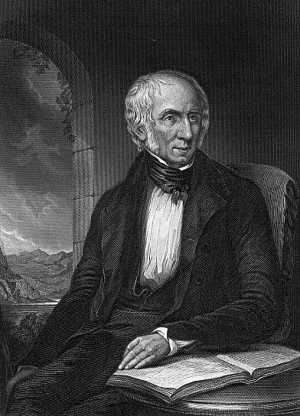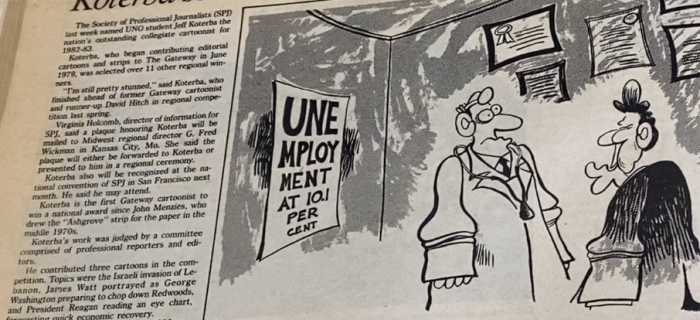Should Modern Newspapers Publish Poetry?
When one thinks about poetry, perhaps two extreme versions come to mind. On the one hand, there is the poetry of the Western canon with poets such as William Wordsworth, John Milton and Emily Dickinson. On the other hand, some may think of contemporary poets like Rupi Kaur, who cater their writing style to social media sites such as Instagram. Evidently, poetry is a genre that is immensely broad and this may cause one to wonder if it can find a home in the modern newspaper.

Many modern newspapers follow a similar format, with various sections for sports, business or entertainment to name a few. Now, imagine if there was a section strictly for poetry. While this may raise some questions about the purpose of publishing poetry in the newspapers, this is a powerful and useful way for the general public to engage with this art form.
Poetry and its Function in Society
In modern society, poetry has taken a backseat to prose and some may say that outside of a scholarly context, it is barely relevant. There is an air of complexity that envelops poetry, making it appear intimidating and puzzling to anyone who lacks experience with this writing style. However, this has not always been the case as there was once a time wherein poetry was greatly preferred over prose.

The Victorian era was one of much chaos and confusion as many struggled to find a meaning or purpose in life. Scientific discoveries, such as Darwin’s theory of evolution, caused many to doubt their Christian faith. At the time, this faith had been at the center of everyone’s lives and understandably, Darwin’s discovery greatly disrupted many people’s self-identity and beliefs. In response to this loss of meaning in life, there was a belief that poetry would eventually take the place of religion and the Church. Poets were seen as wizard-like sages who could guide the masses to find moral and ethical guidelines. This notion is depicted in John Martin’s famous painting The Bard wherein a poet stands atop a cliff which overlooks an army that he appears to be guiding.
As it is now known, this did not end up occurring, so how did poetry manage to fall down the stairs of relevance? Art has always been somewhat of a cultural artifact which has the capacity to portray and encapsulate the state of society and humankind in a given time period. Poetry is no different; as mentioned previously, during the Victorian era, poetry captured the chaos and confusion that came with scientific advancements as it provided an alternative source to find a purpose in life. Throughout this era, poetry also managed to represent the debate which had been occurring surrounding the role of women in society. Poems such as Christina Rossetti’s Goblin Market and Anna Barbauld’s Washing Day capture various opinions on where and how Victorian women should behave and present themselves.
Similarly, in the Modernist period, the early 1900s to the 1940s, much of the poetry and writing reflected the state of this society. Characterized best in literature by T.S. Eliot and Virginia Woolf, modernist literature often was experimental and dealt with themes of alienation and disconnect between humanity. While there is not one standalone reason for the shift to this period, many point toward the First World War. This war shattered many’s faith in humankind and is generally accepted as the main factor which fuelled this era of anxiety-riddled art. Perhaps the most well-known example of a modernist poem is Eliot’s The Love Song of J. Alfred Prufrock which highlights the attempts of the titular character to confront his isolation from the rest of society.

Fast-forwarding to today, it seems that poetry no longer garners the attention that it used to. In the whirlwind of today’s society, poetry has found itself fighting for attention against newer art forms such as film and music. Movies and music have seamlessly captured the raw emotions and societal complexities that once danced within the lines of poems and they have done so in a manner that is outwardly more entertaining and approachable. All the while, poetry has taken a dramatic shift and evolved into an art form that is highly confessional and often accompanied by illustrations and other visuals. It is certainly possible that this increasingly personal style of poetry has not appealed to all enthusiasts of this genre and this may attribute to a decline in readership.
While poetry today may not play a considerable role, throughout time, it has clearly demonstrated that it can successfully be used to communicate relevant information about current issues. An example of this can be found in Rudyard Kipling’s poem The White Man’s Burden. In this poem, the speaker highlights the supposed responsibility of “the White Man” to “civilize” and “guide” the natives of the Philipines. With a modern lens, it is understood that Kipling’s writings were fuelled by a dangerous racist perspective, however, at the time of its publication, this issue of imperialism and colonialism was incredibly relevant. In 1899, the year The White Man’s Burden was published, readers would gain valuable information regarding these topics such as the general opinion on the issue of colonialism as well as some reasons to argue for it. Evidently, not only does this poem provide readers with key details about what would have been a current topic, but it also opens an avenue for greater discussion as it arms readers with various argumentative points that one can mull over either internally or externally.

A more modern example that displays how effective poetry can be at communicating information can be found in Margaret Atwood’s The Immigrants. There is a great amount of debate in the modern world about topics of immigration and geopolitics and it is easy to forget that these are not just empty words and that these debates have immense consequences on the lives of many around the world. Atwood’s The Immigrants portrays the experiences of immigrants by highlighting the hopes, challenges, and prejudice that they often encounter. By doing this, the poem encourages the reader to reflect on empathy, understanding, and the importance of human connection. For those who are perhaps just entering the conversation surrounding immigration, this poem could act as a segway of sorts. It instills in the reader the notion that this is a topic worth learning more about and guides them in the pursuit of further knowledge. On the other hand, for those well-versed in the discussion of immigration and geopolitics, perhaps this poem allows them to break down the walls of disillusionment that they might have and realize that the discussion of immigration is a discussion of real human lives. Through doing this, it is once again revealed that poetry has the profound ability to inform the public on current issues as well as create opportunities for an increase in the discussion of these topics.
As demonstrated through the poems by Kipling and Atwood, it appears that poetry does in fact have the ability to provide valuable information on relevant news topics and it now seems more possible to imagine a world wherein poems are commonplace in the modern newspaper. However, where would these poems be found? Would they have their own section similar to a Sports or Business section? More importantly, what good does it do to have poetry in newspapers? There is already an established method to share information through traditional articles, so why would there ever need to be an incorporation of poetry?
Poetry’s Fit in the Modern Newspaper
There are two possible ways in which poetry could find a permanent home in newspapers. The first, being more traditional, would be reminiscent of editorial or political cartoons. Similar to political cartoon sections, newspapers can reserve specific areas for poetry, either featuring works from regular writers or for an increase in community engagement there could be regular submissions from the public. These curated sections offer readers a sanctuary from the fast-paced news cycle, immersing them in introspective and thought-provoking verse.

On the other hand, perhaps poetry should not be cornered off into its own section. By having reserved pages strictly for poetry, it is easy to imagine that many would simply skim over or entirely skip these sections. In order to avoid this, poetry could be placed with related articles. Poetry has the unique ability to combine facts with feeling and newspapers can use this to their own advantage. As was previously discussed, poetry allows its readers to feel empathy and connect on a personal level with issues that many have no experience with. Newspapers could strategically place, for example, Atwood’s The Immigrants above an article about new immigration policies in the U.S.A. and this could easily increase readership. There are bound to be different topics or articles that people are unfamiliar with in newspapers and placing a related poem before these articles could help curb reader disengagement. Upon reading these poems, perhaps the reader would become more interested in the previously unknown topic and feel motivated to learn more about the facts of the issue.
The benefits of publishing poetry in newspapers would be felt for a long time. Newspapers would gain an increase in readership and community engagement, and perhaps more importantly, there would be a demystification and democratization of poetry. In today’s world, people who leisurely read poetry are somewhat of a rarity and why is this? It is generally agreed upon that outside of a scholarly context, poetry is a daunting and intimidating form of writing. It is difficult for many to start reading poetry simply because one does not know where to begin, but with the publication of poetry in the papers, it would become perhaps one of the most accessible art forms.
While poetry will never reach the height that the Victorians thought it would, there is no reason for this art form to die off. It is a powerful and moving form of writing that captures stories and weaves them through personal and intense emotions and it demands a home in the modern-day newspaper. After all, a newspaper is made to communicate stories and information to the masses and as T.S. Eliot said, “genuine poetry can communicate before it is understood”.
What do you think? Leave a comment.











I’m sharing this article with my students as part of my poetry unit! Thanks for your writing!
I’ve been submitting to newspapers, literary magazines, and journals for a while now, and the submission process does get second-nature after a while. I did have some poetry of mine accepted for publication in a journal, and I was most happy upon reading the acceptance letter! It definitely is a long-game, and patience a virtue. To all those submitting or about to start out, I wish you all the best, and you will succeed, one way or another
It’s one thing getting your poems published, but how do you popularise it? To come from relatively nowhere into the public domain with previously unpublished works, because no one’s heard of you before, it’s not as simple as relying on the worth of your poetry, it takes that ‘something special’ to get noticed rather than being due to any quality of the poem.
Been writing poems and songs for 20 years but never done anything with them.
I have a collection of poems I’m looking to publish. Wonder how the future looks. Thanks for the read.
As someone who’s been hesitant about poetry, this article makes me reconsider and read more poetry when I come across it in the newspapers.
On how poetry can encapsulate societal shifts makes me wonder what other artistic forms could enhance journalism.
Lovely read.
Weaving poetry within articles could be a clever way to make unfamiliar topics more approachable.
Agreed. Poetry could lend an artistic tone and flourish to what otherwise may be a serious piece of writing.
“The Immigrants” quite effectively shows poetry’s ability to humanize complex topics.
It certainly can bridge the empathy gap.
I just mail my poetry to myself and never open it. =)
It is worth noting that in the last two years, many literary magazines in both Canada and the US report the highest volume of submissions they have ever received. One editor told me that they had to drop their acceptance rate from 2% to 1% because of this. Some journals have restricted submissions or even stopped accepting new submissions (except for contests) for the time being. As for writers, response times are longer due to the volume of material journals need to review.
Getting my short piece published in a magazine next month!
If you get published in a magazine, how long do you have to wait to publish your work in a book? Do you have to wait?
You can publish your poems immediately after they appear in a poetry magazine. When I published my first book, there were still some poems that were accepted for publication that didn’t release yet. That’s still ok. You’ll notice in the back or front of poetry books, there’s an acknowledgments page that acknowledges where the poems appeared first. That’s all you need to do.
I don’t really see how this is relevant to the article. But anyway, you generally don’t have to wait at all. Most poetry book and chapbook publishers don’t really care if individual pieces have been published previously. In some cases, the magazine will require you to provide credit as the first publisher.
Very relevant topic. And I see many writers who are commenting here. Is anyone into Black Out poetry?
I’ve discovered black out poetry through Instagram maybe half a year ago, and I’ve been in love with it ever since. And just earlier today I’ve done a couple of these poems! It such a fun form of poetry to make, and it can be so expressive, even more so than “regular” poetry.
Oh my god. You just gave me the most awesome idea: I’m going to get a book from a thrift store or book sale, and everyday I’ll make a poem out of one page until I end up finishing the entire book. I’ll decorate the cover and give it to someone special (my boyfriend) as a gift.
I did blackout poetry in my English class last year which was quite fun. Our topic was Syrian refuges and I did one I’m pretty proud of. Although, I didn’t use all black, I used other coloured sharpies to have a drawing combined with the blackout poetry (which everyone was supposed to do anyway), which I think turned out nicely. All in all, it was really fun.
I’ve always been fascinated by alternate devices for arriving at poetry.
I have never heard of Black Out Poetry before. Also, great article here!
It is one of the most innovative and artistic ways to create poetry nowadays
I’ve just started with black out poetry and it’s beautiful and funny.
I usually do collage poetry which is zeroxing different pages of books and cutting out words, its fun being able to move the words around to create poetry. But I need to explore blackout poetry as well!
I’ve recently begun trying to write poetry, and this looks like a fun way to do it. I imagine it’s also a good exercise for getting a better eye (ear? feeling?) for the rhythm of language.
This is an awesome idea! I can finally repurpose some of my unwanted books!
My class did blackout poetry as a unit last year in writing and I LOVED IT.
This sounds so cool! I’d never heard of it before but I definitely want to try it out.
I need to do this for my Creative Writing class!
I did this as a library program with my teens last year. They really enjoyed it and got super creative!
I agree that incorporating poetry into articles is a good idea in theory– I can see how it could fit as page breaks or transitions in the piece, particularly in physical magazines. However, I do think the prevalence and necessity of ad space in digital publications would make it difficult to include poetry in pieces, simply because it takes space away from ad revenue.
It would make sense for newspapers to update their general formats to incorporate more varied types of content, especially with the growing popularization of digital newspapers and daily standalone articles. I agree wholeheartedly with the fact that an ‘air of complexity’ certainly envelops poetry and that introducing it in an everyday setting might help to demystify the genre. Plus, a consistent exposure to poetry would help readers realize that poetry is a broad genre with hundreds of conventions and possibilities beyond the hoity toity or highly confessional types mentioned above.
Interesting article overall. But I’m skeptical of the idea put forth here that Victorians in general had high ambitions concerning the role of the poet, as a single painting doesn’t provide much evidence
thank you for this insightful article
I feel that the most overt barrier to the integration of poetry in news reporting is the applied value of characters. Prominent news papers that boast substantial readerships simply cannot afford to sacrifice blocks of text that would otherwise be used to better reflect the true intent of the author or related factually substantiated information. When the standardized editing process involves cleaving writers’ work to it’s barest form, i worry that very few would leap towards the direct quotation of preexisting work. (Admittedly, referring to the work by name could very well offer readers the opportunity to further pursue the content, but this falls short in the intent of bringing poetry to the limelight, as many would surely fail to take note of it).
to be clear, I agree with the sentiment that poetry deserves more attention and respect in the modern world, and I certainly feel it has a place, though not necessarily in journalism. I appreciated how poetry was presented as a tool of ambiguity… In it’s inability to express concrete concepts it draws the ability to exist outside of the limitations of veritable fact, and can, as in the case of Atwood’s piece on immigration, give meaningful context to individual experience. It is for this reason that I feel that poetry might be better suited for historical recontextualization. This is especially significant given the impending death of trusted content (in seeing AI’s ever increasing ability to generate faux imagery or parrot voices). The reason i feel that poetry isn’t suited for newspaper (and isn’t generally accessible in the first place) is that the aforementioned ambiguity is produced by shared subconscious knowledge of the function of language, and is fostered by cultural homogeneity. This denies authors the ability to properly control their intentions, and very likely denies large sections of the population (namely intersectional minorities) the power to understand the work properly. Poetry, moreso than any other piece of communicative work, is severely damaged by the passing of time and the loss of familiarity with linguistic norms. This is precisely why poems deserve a comprehensive record keeping process, by which they are categorized based on the implications of their language and their more general intentions. This would allow the populous to accurately track the ever evolving rules of language, and draw upon works related to specific world events in hopes of drawing upon individually centered moral context.
In the evolving landscape of media consumption, the question of incorporating poetry into modern newspapers prompts a consideration of the changing needs and expectations of readers. Striking a balance between traditional journalistic values and the desire for diverse, engaging content is key. Whether modern newspapers should publish poetry ultimately depends on their target audience, editorial vision, and the evolving role they envision within the broader cultural conversation. the question remains: should we embrace the infusion of poetry to diversify and deepen the reading experience, or does the traditional identity of newspapers as purveyors of factual news stand paramount?
I guess the underlying question here is still whether the role of newsmedia is to convey objective information, or also influence the views of those reading it with tolls beyond just facts.
To use your example, publishing The White Man’s burden for mass consumption has potentially disastrous consenquences, because most poetry is not just detail, but also point of view. And certain points of view (both damaging and otherwise) are inevitably liable to get more exposure if media which claims to be unbiased began publishing poetry.
It is really interesting to think of newspapers as a lighthearted medium rather than purely about news. Adding poetry could be a way of doing that. It also allows local writers to have their work on display and seen by the community.
Newspapers regularly feature works of cartoonists and columnists, so why not also poets? There can be interesting things written in the poetic form to appeal to a wide range of tastes.
It is difficult
to get the news from poems
yet men die miserably every day
for lack
of what is found there.
– William Carlos Williams
Interesting article. I’m not sure newspaper readership would necessarily increase but poems could add a different dimension to reading a newspaper. Furthermore, the types of poems would become an issue, Alan Ginsberg versus Henry Wadsworth Longfellow.
I partly agree with including the (good) poems to be published in Modern Newspapers. It adds meaningfulness part of life to other materials of the neswspapers.